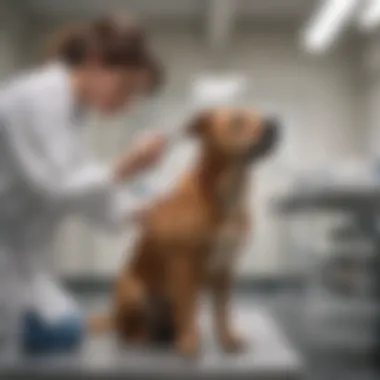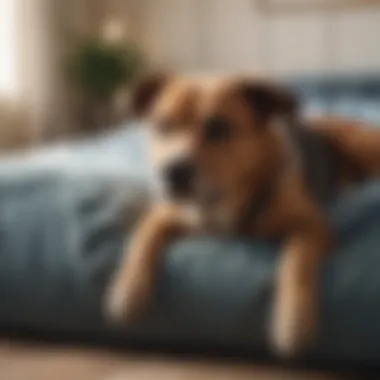Essential Steps for Managing Your Dog's Explosive Diarrhea


Intro
Explosive diarrhea in dogs can be a distressing experience for both the pet and the owner. It signals underlying health issues that require immediate attention. Understanding how to effectively manage this condition is essential for preserving your dog's health and well-being. This article will provide guidance on what actions to take when faced with this challenge, addressing potential causes, immediate responses, when to seek veterinary assistance, and ways to mitigate future occurrences.
Understanding Your Pet
Dogs possess a variety of traits that can influence their health, including breed characteristics and temperament. Recognizing these aspects can help owners anticipate and manage health issues, including gastrointestinal distress.
Breed Traits
Certain breeds are predisposed to specific health conditions, including digestive issues. For instance, larger breeds such as Great Danes or Boxers are more prone to conditions like bloat, which can lead to severe diarrhea. Smaller breeds may have different vulnerabilities, such as sensitivities to food changes. Awareness of these traits enables proactive health management.
Common Temperaments
The temperament of a dog can also play a role in their health. Stressed or anxious dogs may experience digestive issues, leading to diarrhea. Identifying triggers that cause stress, such as changes in the environment or routine, can assist owners in mitigating stress-related digestive problems.
Special Needs
Some dogs have special dietary needs or require specific feeding regimens which, if not adhered to, can lead to gastrointestinal disturbances. Consulting with a veterinarian about your dog's dietary requirements is crucial, especially when issues like explosive diarrhea arise.
Pet Care Essentials
Effective pet care encompasses multiple aspects, including nutrition, grooming, and overall wellness. Paying attention to these elements plays a vital role in maintaining your dog’s health and preventing conditions like diarrhea.
Nutrition and Feeding Guidelines
A balanced diet tailored to your dog's specific needs is fundamental. Invest in high-quality dog food, as this choice can reduce the risk of gastrointestinal issues. Be wary of sudden changes in diet; any transitions should occur gradually over several days to avoid upsetting your dog's stomach.
Grooming Tips and Techniques
Regular grooming helps maintain your dog’s general health. Keeping your dog clean can prevent skin infections and irritations that might contribute to stress and gastrointestinal issues.
Health and Wellness
Routine veterinary check-ups are essential. Regular vaccinations, parasite prevention strategies, and health screenings contribute to overall wellness. These measures can assist in early detection of potential health problems that lead to diarrhea.
Training and Behavior
Understanding your dog's behavior is important not just for training but also for maintaining their health. Dogs may show signs of discomfort or distress, which could include changes in bowel movements.
Basic Training Techniques
Implementing basic commands can improve your dog’s overall behavior and reduce anxiety. Training provides mental stimulation and strengthens the bond between you and your dog, leading to a calmer pet.
Behavioral Problems and Solutions
Addressing behavioral issues proactively can help maintain your dog’s digestive health. Aggression, fear, or separation anxiety can lead to stress, which might manifest as diarrhea.
Mental Stimulation Activities
Engaging your dog in mentally stimulating activities can alleviate stress and anxiety. Puzzles, toys, and supervised playdates with other friendly dogs can boost your dog’s mental health, which is linked to their digestive well-being as well.
Engaging with Your Pet
Interaction and bonding with your dog are vital for their emotional and physical health. Developing a strong relationship will help reduce their stress levels, which can indirectly impact their digestive system.
Interactive Games and Toys
Utilizing interactive toys can keep your dog mentally stimulated and occupied. Look for toys that promote problem-solving, as they can help redirect any pent-up energy into positive play.
Safe Outdoor Activities
Outdoor activities such as walks and fetch sessions provide valuable exercise and fresh air. Ensure these are safe spaces where your dog can freely explore without constant stress from other animals or environments.
Family-Friendly Pet Interactions
Involve all family members in caring for and engaging with your dog. This shared responsibility can create a more stable environment for your pet, which positively influences their overall well-being.
Pet Adoption and Integration
Bringing a new pet into your home involves understanding their unique needs and traits. This integration is essential to ensure a smooth transition which can influence their future health and behavior.
Choosing the Right Pet for Your Lifestyle


Discuss your lifestyle when considering a new dog. Factors to consider include time, space, and activity levels. Ensuring a good fit can reduce stress for both you and your new pet.
Preparing Your Home for a New Pet
Make your home welcoming and safe for the new arrival. Remove any hazards and designate areas for eating, sleeping, and playing. A warm and secure environment aids in reducing stress.
Tips for Smooth Prolusion
Take time to properly introduce a new pet to existing ones. Ensure controlled introductions, allowing for gradual acclimatization to prevent overwhelming any animals involved.
Effective management of digestive issues in dogs not only prevents discomfort but also promotes long-term health. Always consult with a veterinarian for specific concerns regarding your dog's health and well-being.
As the article unfolds, you will gain practical insights on managing explosive diarrhea effectively, understanding preventive measures, and ensuring the overall health of your beloved pet.
Understanding Explosive Diarrhea in Dogs
Understanding explosive diarrhea in dogs is crucial for any pet owner. It's not just a temporary issue but can indicate underlying health problems that should not be ignored. The ability to differentiate between various types of diarrhea helps in determining the right course of action. Knowing how to respond swiftly can prevent severe dehydration or other complications.
Definition of Explosive Diarrhea
Explosive diarrhea is characterized by sudden, forceful bowel movements that are often liquid in consistency. This condition can arise suddenly and can be distressing for both the pet and the owner. The impact of this condition goes beyond mere inconvenience; it may involve significant loss of fluids and electrolytes which can be dangerous.
Recognizing explosive diarrhea early can help in taking necessary precautions. It's essential to observe not just the frequency, but also the odor and appearance of the stool. This information can be vital for a veterinarian's diagnosis.
Distinction Between Normal Diarrhea and Explosive Diarrhea
While many pet owners may dismiss diarrhea as a common issue, understanding the distinction is important. Normal diarrhea can often be mild and manageable, usually linked to dietary changes, a temporary upset stomach, or minor infections.
In contrast, explosive diarrhea tends to be more severe and sudden. Here are some differentiating factors:
- Onset: Explosive diarrhea appears suddenly and may be accompanied by a sense of urgency.
- Consistency: Explosive diarrhea is typically watery or bloody, often lacking formed consistency.
- Volume: Explosive diarrhea may result in significant amounts of stool loss in a short period.
- Accompanying Symptoms: Dogs may also show signs such as vomiting, lethargy, or fever along with explosive diarrhea.
Recognizing these signs can greatly influence how quickly and effectively you respond. Prompt action is essential in managing your dog's health and comfort.
Common Causes of Explosive Diarrhea
Understanding the common causes of explosive diarrhea in dogs is essential for pet owners. Identifying the underlying issue enables appropriate intervention, potentially preventing further complications. Explosive diarrhea can signal various issues, from dietary mistakes to serious health conditions. This understanding empowers pet owners to take informed actions in managing their dog's health and well-being.
Dietary Indiscretion
Dietary indiscretion is a leading contributor to explosive diarrhea. This term refers to a pet consuming something inappropriate. Dogs are naturally curious and might eat anything from spoiled food to harmful human snacks. Such dietary indiscretions can lead to sudden gastrointestinal upset.
Common triggers include:
- Human foods high in fat and sugar, like chocolate or baked goods.
- New foods introduced into their diet without gradual transition.
- Inedible objects, such as toys or household items.
The ensuing digestive chaos results in loose stools or explosive diarrhea. Pet owners should monitor food intake and avoid giving scraps from the table. If a dog has a history of dietary indiscretion, a consistent diet is key.
Infections
Infections from bacteria, viruses, or fungi can lead to explosive diarrhea. Pathogens such as Salmonella or Parvovirus can severely affect a dog's gastrointestinal tract. The signs often escalate quickly, leading to dehydration and other health risks.
Common infections to consider are:
- Bacterial infections caused by contaminated food or poor hygiene.
- Viral infections, particularly in puppies, which lack full vaccination.
- Fungal infections, though less common, can happen.
Prompt veterinary consultation is advised if infections are suspected, as they may require specific treatments or medications. Best practices include ensuring proper vaccinations and practicing good sanitation with food and surroundings.
Parasites
Parasites are another common cause of explosive diarrhea in dogs. These organisms can invade the intestines and wreak havoc on digestive functions. Common parasites include roundworms, hookworms, and Giardia. Each of these can significantly disrupt normal digestion, resulting in diarrhea.
Signs of parasitic infection may include:
- Sudden weight loss despite a good appetite.
- Vomiting or lethargy alongside diarrhea.
- Presence of worms in feces or around the dog's rear.
Regular veterinary checks and deworming schedules can help avert this issue. Pet owners should be vigilant about their pet's symptoms and consult a vet if they suspect parasites.
Underlying Health Conditions
Underlying health conditions can also manifest as explosive diarrhea. Issues like pancreatitis, inflammatory bowel disease (IBD), or even certain cancers can present gastrointestinal symptoms. These conditions often need ongoing management and close veterinary observation.
Key signs that an underlying issue may be present include:
- Chronic diarrhea or weight loss.
- Changes in appetite or behavior.
- Additional symptoms like vomiting, fever, or bloating.


In these scenarios, timely veterinary intervention is critical. A thorough examination and diagnostic testing may be required to uncover the root cause. Awareness of how non-diarrhea symptoms may connect helps pet owners address concerns early.
Understanding these common causes elevates a pet owner's ability to navigate the complexities of canine health, providing peace of mind and better outcomes.
Immediate Actions to Take
When a dog experiences explosive diarrhea, urgent action is crucial. The steps taken immediately can make a significant difference in your pet's recovery and comfort. Proper management not only helps alleviate the situation swiftly but also prevents additional complications.
Assessing the Severity
First, take a moment to assess the severity of the situation. Not all diarrhea poses the same risk. Factors to consider include:
- Frequency of bowel movements: Is your dog going outside more than usual?
- Appearance of stool: Is it watery, bloody, or contains unusual particles?
- Behavioral changes: Is your dog lethargic, showing signs of pain, or losing interest in food?
Evaluating these elements offers insight into whether the diarrhea is mild or suggests a serious issue. If you notice any signs of severe distress, act promptly to consult a veterinarian.
Fasting Protocols
In some cases, implementing a fasting period can be beneficial. Withholding food for 12 to 24 hours can help the digestive system reset. This pause allows your dog's gastrointestinal tract to recover without the burden of processing food. However, ensure that your pet continues to have access to clean water. Overfeeding immediately after a fasting period can lead to further complications. When reintroducing food, start with small portions of bland diets such as boiled chicken and rice.
Hydration Importance
Hydration cannot be overstated in situations of explosive diarrhea. Loss of fluids can lead to dehydration, which is dangerous. Monitor your dog for signs of dehydration which include:
- Dry gums
- Excessive panting
- Loss of skin elasticity
Encouraging your dog to drink water is essential. If your dog refuses to drink, consider offering ice chips or a pet-safe electrolyte solution. In severe cases, veterinary intervention may be necessary to administer fluids intravenously.
Dietary Adjustments
After the initial fasting period, carefully introducing dietary changes is vital. A bland diet can help ease upset stomach and stabilize digestive functioning. Some recommended options include:
- Boiled, skinless chicken
- Plain white rice
- Canned pumpkin (not filling)
Such food items are gentle on the stomach and can help form firmer stools. It's important to avoid feeding your dog any treats or table scraps until the digestive issue has resolved completely.
Important: Always consult a veterinarian if your dog continues to have diarrhea after dietary adjustments or shows other troubling symptoms.
When to Consult a Veterinarian
Recognizing when to seek veterinary care for your dog experiencing explosive diarrhea is crucial. This condition may initially seem manageable, but underlying issues could pose serious risks. Timely intervention is often key to preventing complications that can arise from dehydration or a more serious illness.
With explosive diarrhea, monitoring your dog's overall health is essential. Assess symptoms that can escalate or indicate a more severe problem. Consulting with your veterinarian can lead to early detection of potential health risks, enabling effective treatment. Additionally, professional assessment can relieve owner anxiety, providing clarity on the health status of your pet.
Signs Indicating Veterinary Care
Several signs should prompt immediate consideration for veterinary consultation. If your dog shows any combination of these symptoms, do not hesitate to call your vet:
- Persistent diarrhea: If diarrhea lasts more than 24 hours, professional evaluation is necessary.
- Blood in stool: This signals a serious issue and should be addressed urgently.
- Vomiting: Frequent vomiting alongside diarrhea may indicate a more serious condition.
- Lethargy: A lack of energy can be a sign of dehydration or other ailments.
- Loss of appetite: If your dog refuses to eat for more than a day, this calls for attention.
- Abdominal pain: Signs of discomfort or sensitivity in the abdomen may require immediate assessment.
Staying observant can help differentiate between mild digestive upset and signs that warrant veterinary care.
Preparing for the Vet Visit
When it comes time to see the veterinarian, preparation can enhance the effectiveness of the consultation. Consider the following steps:
- Gather information: Document your dog’s symptoms, their duration, any changes in diet, and any recent exposure to new food or environments.
- Check vaccination records: Bring your pet's vaccination history, especially if infections are a concern.
- Know your dog's weight: Providing current weight can help the veterinarian determine appropriate medication dosages.
- Prepare samples if needed: If safe to do so, bring a sample of your dog’s stool for analysis.
- List questions and concerns: Having a prepared list can help ensure you cover all your concerns during the visit, allowing for a thorough discussion.
Preparing in these ways can lead to a more productive visit and more accurate diagnosis from your vet.
Remember, timely consultation with a veterinarian can be critical in safeguarding your dog's health.
Diagnostic Tests and Procedures
When dealing with explosive diarrhea in dogs, understanding diagnostic tests and procedures is crucial. These assessments help identify the underlying causes of the condition. Proper diagnosis not only assists in determining the right treatment but also enhances the overall well-being of the dog, preventing future occurrences.
Veterinarians have various methods to investigate gastrointestinal issues. Some tests are straightforward, while others require more specialized techniques. Early diagnosis is key to addressing the problem effectively.
Common Diagnostic Techniques
Veterinarians commonly use several diagnostic techniques to pinpoint the cause of explosive diarrhea. Some of these include:
- Fecal exams: This is one of the first tests performed. It helps detect parasites, such as worms or protozoa, which can lead to diarrhea. A simple stool sample is usually sufficient for analysis.
- Blood tests: Blood work can provide valuable insights into the dog’s overall health. By checking for elevated white blood cell counts, veterinarians can gauge if there is an infection or inflammation present.
- X-rays and ultrasound: These imaging techniques allow for a visual examination of the gastrointestinal tract. They can help identify obstructions, tumors, or any foreign objects that may be causing issues.
- Endoscopy: In more severe cases, a vet might recommend an endoscopic examination. This procedure involves inserting a camera into the dog’s gastrointestinal tract to visually assess internal conditions and to take biopsies if necessary.


Each technique has its specific use and relevance depending on the dog's condition and history.
Potential Findings
The diagnostic tests may reveal several potential issues that could be affecting your dog's digestion. These findings include:
- Parasites: If parasites are found, it indicates that treatment for deworming is necessary. This is a common cause of diarrhea in dogs and is often easily treatable.
- Infections: Tests might uncover bacterial or viral infections, which often require medication such as antibiotics or antiviral drugs.
- Inflammatory bowel disease (IBD): Persistent gastrointestinal symptoms may lead to the diagnosis of IBD, indicating chronic inflammation. Management often requires a combination of medication and dietary changes.
- Tumors or masses: If abnormal growths are detected, further examination and treatment will be necessary, possibly involving surgery or specialized care.
Understanding the potential findings from these diagnostic tests can help pet owners make informed decisions about their dog’s health. Timely intervention can prevent complications and support recovery.
Choosing the right diagnostic approach is essential in addressing the distress of explosion diarrhea and ensuring continued pet health. Proper diagnosis can pave the way for effective treatment and better quality of life for your dog.
Treatment Options Available
Explosive diarrhea in dogs is a troubling experience for both pets and their owners. Addressing this condition effectively requires understanding various treatment options available. Treatments focus not only on alleviating the immediate symptoms but also on supporting the dog's overall recovery and long-term health. This section outlines the vital elements of medication, dietary recommendations, and the use of probiotics and supplements.
Medications
Medications play a key role in managing explosive diarrhea. Depending on the underlying cause, the veterinarian may prescribe various types of medications. Antidiarrheal agents may be recommended to help firm up stools. Antibiotics can be necessary if a bacterial infection is present. It's essential to follow the vet's directions about dosage and duration.
Always consult your veterinarian before administering any medication to your dog. Some drugs can be harmful or ineffective without proper guidance.
It is also crucial to avoid human medications not approved for use in dogs, as these can lead to severe side effects.
Dietary Recommendations
Dietary changes often contribute to managing and preventing episodes of explosive diarrhea in dogs. After an acute episode, it is advisable to introduce a bland diet gradually. Options such as boiled chicken and white rice are commonly recommended. These foods are gentle on the digestive system and can help achieve consistency in the dog's stool.
It is also important to monitor the dog’s response to dietary adjustments. Keeping a food diary can help identify any triggers in your dog's food. Avoid sudden transitions between food types, as this can cause further gastrointestinal upset.
Key Points on Dietary Management:
- Introduce bland foods gradually.
- Avoid sudden changes in diet.
- Monitor for food intolerances.
Probiotics and Supplements
Probiotics can be a valuable addition to your dog's recovery plan. These beneficial bacteria help restore the natural balance of gut flora, which may be disrupted during episodes of diarrhea. Many veterinarians recommend specific canine probiotic formulations tailored to optimize gut health.
In addition to probiotics, certain supplements like pumpkin can provide fiber, helping to regulate bowel movements. Always discuss the use of any supplements with your veterinarian to ensure they are suitable for your pet's situation.
Benefits of Probiotics and Supplements:
- Restore gut flora balance.
- Support overall digestive health.
- Can help prevent future occurrences.
Preventive Measures
Preventive measures are crucial in avoiding the distressing situation of explosive diarrhea in dogs. By focusing on systematic management and proactive care, pet owners can mitigate risks associated with digestive issues. Understanding these preventive strategies is not just about addressing immediate symptoms but establishing a foundation for long-term canine health. This section explores the key components that contribute to a healthier digestive system for dogs.
Diet Management
Diet management plays a vital role in preventing explosive diarrhea. The quality of food your dog consumes is directly related to their overall digestive health. A balanced diet tailored to your dog's specific needs can reduce instances of dietary indiscretion and intolerance.
- Quality Food: Choose high-quality dog food that meets nutritional standards. Avoid fillers and artificial ingredients. Look for brands that emphasize natural ingredients and offer appropriate fiber levels.
- Gradual Changes: When changing your dog's diet, always transition slowly. Sudden changes can irritate the digestive system, leading to diarrhea. Mixing the new food with the old food gradually over a week helps ensure smoother transitions.
- Observe Sensitivities: Keep a close eye on what your dog eats. Take note of any gastrointestinal distress that follows specific foods. Keeping a food diary can help track which items may lead to problems.
By focusing on diet management, pet owners can significantly cut down on the development of explosive diarrhea.
Regular Veterinary Checkups
Regular veterinary checkups are another essential preventive measure for managing your dog's health. Routine visits allow for early detection of potential health issues before they escalate, including problems that could contribute to explosive diarrhea.
- Routine Assessments: During checkups, vets assess your dog's general health, weight, and dental state. These factors can influence a dog's ability to digest food properly.
- Vaccinations and Dewormings: Ensure that vaccinations are up to date. Vaccines can protect against various infections that could lead to gastrointestinal disturbances. Deworming protocols also prevent parasite infestations which can cause diarrhea.
- Discuss Symptoms: Even if your dog seems healthy, always discuss any unusual behaviors or symptoms with your vet. They can offer insights into potential underlying issues that may not be immediately apparent.
By prioritizing regular veterinary visits, dog owners can create a proactive approach to maintaining their pet's health.
Maintaining a Clean Environment
Maintaining a clean environment is often overlooked, yet it is a fundamental aspect of preventing health issues, including explosive diarrhea.
- Hygiene Practices: Regular cleaning of your dog's living spaces eliminates bacteria and parasites that can contribute to digestive upset. Ensure that food and water bowls are washed frequently.
- Prompt Clean-Up: Immediately clean up any messes caused by your dog, especially outdoors. This reduces the chances of other dogs getting exposed to harmful pathogens.
- Safe Spaces: Provide a secure area where your dog can play and rest. Limiting exposure to other animals reduces the risk of infections that can lead to diarrhea.
Epilogue
Explosive diarrhea in dogs is not merely a nuisance; it is a serious health concern that demands prompt attention. In this article, we explored various aspects of this condition to provide dog owners the knowledge necessary to respond effectively. Understanding the symptoms, recognizing potential triggers, and identifying when veterinary help is necessary form the backbone of proper canine care.
Recap of Key Points
- Understanding Symptoms: Recognizing the difference between normal diarrhea and explosive diarrhea is vital for determining the urgency of the situation.
- Identifying Causes: Various factors such as dietary indiscretion, infections, and underlying health issues can lead to explosive diarrhea. Each cause requires a different approach.
- Immediate Actions: Assessing severity, managing hydration, and implementing dietary adjustments are crucial steps to help alleviate the symptoms.
- Veterinary Consultation: Knowing when to seek veterinary care is essential. Unusual symptoms or prolonged diarrhea often necessitate professional evaluation.
- Preventive Measures: Regular veterinary check-ups and maintaining a clean environment can significantly reduce the frequency of such issues.
Final Thoughts on Canine Digestive Health
Remember: A dog's digestive system is sensitive and can easily be disrupted. Always be proactive in keeping their diet safe and monitor any changes in their health diligently.



